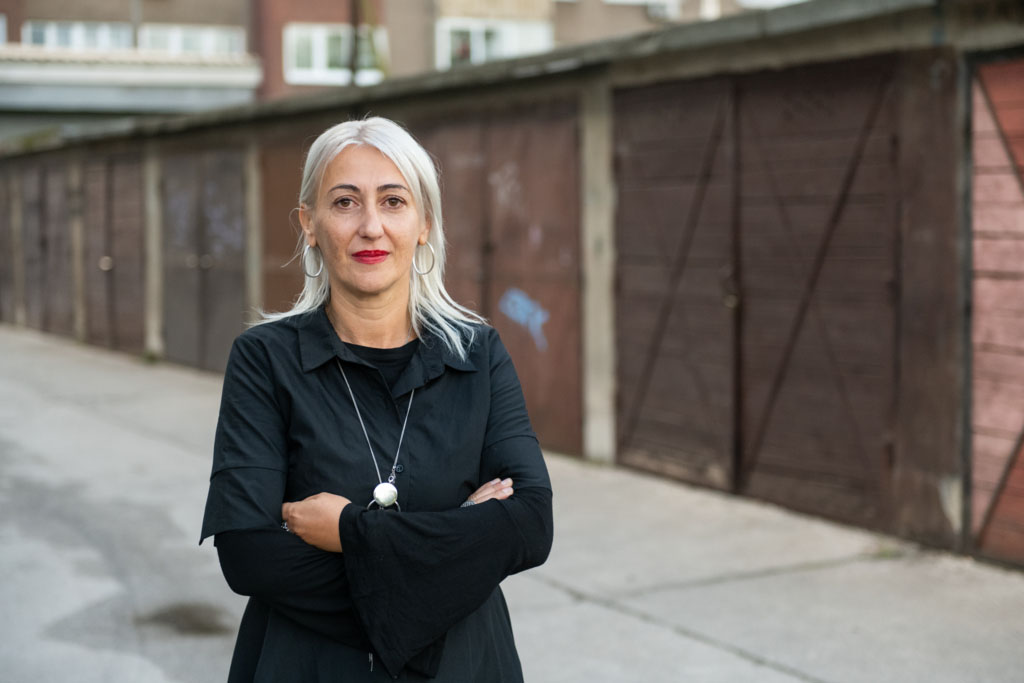On the frontline for abused women in Bosnia and Herzegovina
Triggers, trauma and processing. When Meliha Sendić as a young law student started working at a women’s rights organisation supporting victims and survivors of violence, she had to come to terms with her own experiences of abuse.

A bit of practical knowledge. That was what Meliha Sendić was looking for when she started volunteering at a centre focusing on supporting women with legal aid as a law student. Since joining full-time, she has made both a personal and professional journey—and today she is the president of Center of Women’s Rights.
The organisation has been a partner to The Kvinna till Kvinna Foundation for 26 years and was founded after the war to support women claiming their basic human rights. To this day, they remain committed to supporting women who need legal assistance, many of which are victims and survivors of domestic violence.
“About 80 percent of the women who seek our help are, or have been, victims of violence,” says Meliha.
Carrying family trauma
Since joining the organisation, Meliha has had to come to terms with her own experience of abuse. All the employees participated in a monthly supervised session with a psychologist. During one of these, Meliha had a strong reaction and started crying. At the time, she had no idea of the trauma she was carrying.
The triggers became more and more noticable. She decided to get to the bottom of it and began a journey to recognise and acknowledge the abuse her father had subjected her family to.
When she was 18, Meliha’s parents divorced after 19 years together.
“This was during the war. It was very traumatic for all of us—he literally kicked us out of the house and we had nowhere to go. We lived with a neighbor for two years,” says Meliha.
Meliha was afraid that her mother would be physically attacked on her way to work. In the midst of war, she tried to protect her at the same time as they were all just trying to survive.
“And the divorce was so ugly. They were fighting about the assets and the property. It was something that really marked our life at that time.”
Working on yourself
More than ten years later, she had buried everything at the back of her mind—until that therapy session. She explains that it was one of the most difficult processes in her entire life. But that she was determined to work on herself and the blockages, together with a therapist. It took three years.
“No one can work with other people, especially doing what we do, unless they’ve addressed all of their own traumas and triggers. It’s not only about understanding the person sitting next to you, but also to be able to provide them with support,” says Meliha.
Her work on herself, lead Meliha to start working with other young women. She wanted them to be empowered and able to recognise the different forms of violence there are.
Complicated divorce cases
Center of Women’s Rights support approximately 1,000 women a year through various legal processes. They also provide psychological support.
Usually, women contact the centre because they want a divorce.
“Getting a divorce is easy, you don’t really need a lawyer for that. But then she says ‘I want custody of the children.’ And: ‘He is abusive.’ And then: ‘I’m afraid that if I ask for allemony, he will kill me.’”
“Suddenly, your ‘simple’ legal case has developed into four or five different processes, where you may need to contact the police,” Meliha continues.
Fast and furious relationships
Sometimes the prevailing levels of violence can feel discouraging.
“We live in the 21st century and there have been so many awareness raising and violence prevention activities. And when you have this data that 80% of the women coming here have been victims of violence—that’s really defeating. And it’s definitely not only older generations in rural areas. Let’s break that sterotype right now,” says Meliha.
She exemplifies with a case they handled a few years ago, a young, urban couple in their twenties, where the husband beat his wife because she served lunch before he was seated at the table.
“I’m really worried about this younger generation. They’re very quick to get married, have kids and get a divorce. It’s like everything is in fast-forward mode. And there is a lot of violence in those relationships,” says Meliha.
Still on the frontline
On the question of how she finds the strength to carry on, Meliha answers that she returns to her “why”—why she joined the organisation.
“Working with systemic change and professionals within the public institutions can be exhausting. I know that we are making a difference, but sometimes it can almost seem invisible,” she says.
The fact the centre is still here, still standing, is the greatest achievement of all, according to Meliha.
“We are on the frontline. We are here for all the women who need assistance. Because when something happens to a woman, she needs someone she can turn to to give her the right information. Anyone can be a shoulder to cry on, but we will instruct women on what to do next.”
Kvinna till Kvinna has supported women’s rights in Bosnia and Herzegovina since 1993. The war in Bosnia and Herzegovina ended in 1995 but left behind a traumatised society. On paper, the equality legislation is progressive, but its implementation is patchy. Women earn less and few are appointed to decision-making positions in politics. Violence against women is also widespread.
The Bosnian women’s movement works to promote peace, establish accountability for war crimes and end violence against women. Kvinna till Kvinna supports several partner organisations working with hotlines, shelters and legal assistance for women who are survivors/victims of domestic violence. Learn more about our work in Bosnia and Herzegovina »